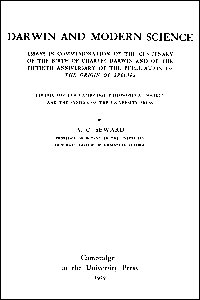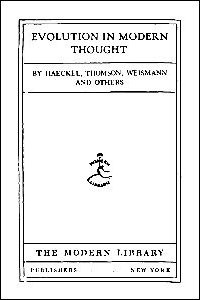J.B.Bury’s works – 1909
![]()
DARWINISM AND HISTORY (1909)
![]()

— March of Progress [The Road to Homo Sapiens] – Rudy Zallinger (1965)
—
![]()
published in:
- A. C. SEWARD – DARWIN AND MODERN SCIENCE; ESSAYS IN COMMEMORATION OF THE BIRTH OF CHARLES DARWIN AND OF THE FIFTH ANNIVERSARY OF THE PUBLICATION OF THE ORIGIN OF SPECIES. Cambridge, University Press, 1909 (pp.529-542)
republished in:
- Ernst HAECKEL, Arthur THOMSON, August WEISMANN, and others – EVOLUTION IN MODERN THOUGHT, Modern Library, Boni and Liveright, Inc., New York. s/d. 1926 (pp.246-263)
- Harold TEMPERLEY – SELECTED ESSAYS OF J. B. BURY, Cambridge, University Press, 1930 (pp.23-42)
![]()
| 2 copies available: | |
|
 |
|
 |
![]()
—
… The “historical” conception of nature, which has produced the history of the solar system, the story of the earth, the genealogies of telluric organisms, and has revolutionised natural science, belongs to the same order of thought as the conception of human history as a continuous, genetic, causal process – a conception which has revolutionised historical research and made it scientific. … [p.529]
—
… In the first quarter of the nineteenth century the meaning of genetic history was fully realised. “Genetic” perhaps is as good a word as can be found for the conception which in this century was applied to so many branches of knowledge in the spheres both of nature and of mind. It does not commit us to the doctrine proper of evolution, nor yet to any teleological hypothesis such as is implied in “progress”. … [p.531]
—
… “Progress” involves a judgment of value, which is not involved in the conception of history as a genetic process. It is also an idea distinct from that of evolution. Nevertheless it is closely related to the ideas which revolutionised history at the beginning of the last century; it swam into men’s ken simultaneously; and it helped effectively to establish the notion of history as a continuous process and to emphasise the significance of time. Passing over earlier anticipations, … it was the political changes in the eighteenth century which led to the doctrine … that the masses are the most important element in the historical process. … the predominant importance of the masses was the assumption which made it possible to apply evolutional principles to history. …
The assimilation of society to an organism, … and the conception of progress, combined to produce the idea of an organic development, in which the historian has to determine the central principle or leading character. … [p.532]
—
… The genetic principle, progressive development, general laws, the significance of time, the conception of society as an organic aggregate, the metaphysical theory of history as the self-evolution of spirit, – all these ideas show that historical inquiry had been advancing independently on somewhat parallel lines to the sciences of nature. It was necessary to bring this out in order to appreciate the influence of Darwinism. …
In the course of the dozen years which elapsed between the appearances of The Origin of Species … and of The Descent of Man (1871), the hypothesis … that man is the co-descendant with other species of some lower extinct form was admitted to have been raised to the rank of an established fact by most thinkers whose brains were not working under the constraint of theological authority. … The prevailing doctrine that man was created ex abrupto had placed history in an isolated position, disconnected with the sciences of nature. Anthropology, which deals with the animal anthropos, now comes into line with zoology, and brings it into relation with history. … Man’s condition at the present day is the result of a series of transformations, going back to the most primitive phase of society, which is the ideal (unattainable) beginning of history. …
… The perspective of history is merged in a larger perspective of development. As one of the objects of biology is to find the exact steps in the genealogy of man from the lowest organic form, so the scope of history is to determine the stages in the unique causal series from the most rudimentary to the present state of human civilisation. … [p.534-535]
—
… The success of the evolutional theory helped to discredit the assumption or at least the invocation of transcendent causes.
Philosophically of course it is compatible with theism, but historians have for the most part desisted from invoking the naive conception of a “god in history” to explain historical movements. A historian may be a theist; but, so far as his work is concerned, this particular belief is otiose. Otherwise indeed … history could not be a science; for with a deus ex machina who can be brought on the stage to solve difficulties scientific treatment is a farce. [536]
—
… From the more general influence of Darwinism on the place of history in the system of human knowledge, we may turn to the influence of the principles and methods by which Darwin explained development. … The investigations of Darwin, which brought them into the foreground, naturally promoted attempts to discover in them the chief key to the growth of civilisation. … the Darwinian theory made it tempting to explain the development of civilisation in terms of “adaptation to environment”, “struggle for existence”, “natural selection”, “survival of the fittest”, etc.
The operation of these principles cannot be denied. … Environment and climatic influence must be called in to explain not only the differentiation of the great racial sections of humanity, but also the varieties within these sub-species and, it may be, the assimilation of distinct varieties. … But on the other hand, it is urged that, in explaining the course of history, these principles do not take us very far … The development of human societies, it may be argued, derives a completely new character from the dominance of the conscious psychical element, creating as it does new conditions (inventions, social institutions, etc.) which limit and counteract the operation of natural selection, and control and modify the influence of physical environment. [537]
—
… The idea … that history could be assimilated to the natural sciences was powerfully reinforced, and the notion that the actual historical process, and every social movement involved in it, can be accounted for by sociological generalisations, so-called “laws”, is still entertained by many, in one form or another.
Dissentients from this view do not deny that the generalisations at which the sociologist arrives by the comparative method, by the analysis of social factors, and by psychological deduction may be an aid to the historian; but they deny that such uniformities are laws or contain an explanation of the phenomena. … But it may be urged that it is patent on the face of history that its course has constantly been shaped and modified by the wills of individuals,which are by no means always the expression of the collective will; and that the appearance of such personalities at the given moments is not a necessary outcome of the conditions and cannot be deduced. [537-538]
—
… The truth is that Darwinism itself offers the best illustration of the insufficiency of general laws to account for historical development. The part played by coincidence, and the part played by individuals – limited by, and related to, general social conditions – render it impossible to deduce the course of the past history of man or to predict the future. But it is just the same with organic development. Darwin (or any other zoologist) could not deduce the actual course of evolution from general principles. [539]
[John Bagnell Bury – 1909]
—

—
This idea [Progress] means that civilisation has moved, is moving, and will move in a desirable direction. But in order to judge that we are moving in a desirable direction we should have to know precisely what the destination is. To the minds of most people the desirable outcome of human development would be a condition of society in which all the inhabitants of the planet would enjoy a perfectly happy existence. But it is impossible to be sure that civilisation is moving in the right direction to realise this aim.
—
John B. Bury (1861-1927)





